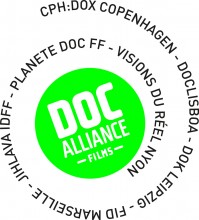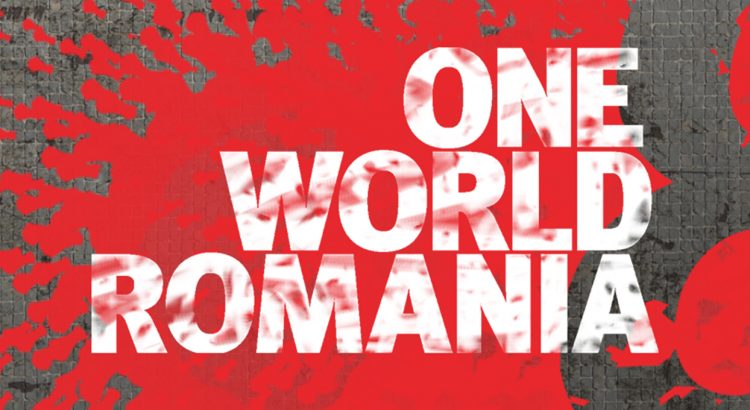For the 8th time, One World Romania festival awakens the screening halls of Bucharest with the power of people’s and documentary accounts of injustice, problems of contemporary democracy and the significance of civil protests. Why does this year’s edition carry the title Kino Maidan? The Festival Director Alexandru Solomon will give you the answer in our guest article.
Andrea Průchová: Dear Mr. Solomon, we are happy to welcome five great films from One World Romania as well as you personally on our portal after one year again. Please tell us what the news are in the programme or the structure of the festival you have developed?
I am very happy we can offer, together with DAFilms.com, this window on creative documentary filmmaking – for the third time! The motto of our 8th edition is ‘Kino Maidan’. It obviously pays tribute to the Kiev events, but it expands its meaning and reaffirms One World Romania as a crossroad between filmmakers and audience, with documentary as a reflection of what happens on the ‘Maidans’ around the globe and as one of the best tools humans have to express. The world seems to be burning and we have worked a lot to select the themes that are covering the main issues that are igniting here and there. More than ever, we feel that speaking about the failures of democracy, our attitude towards nature, injustice and traumas from the past is becoming crucial. We have strengthened our side events that accompany the films and give a better understanding of their topics: be it on Ukraine, on Africa or on the way documentary produces new narratives of Europe. Under the frame Comrade Capitalism, we are organizing a Circuit of History Vandals, since Bucharest has been mutilated by so many unlawful constructions. And we are dedicating more attention to the industry events. More to come below…
This year’s documentary programme brings a unique combination of global and local East European topics. The festival programme concentrates on Africa, it reflects the issues of democracy or freedom but it also pays attention to the transformation of the post-Soviet countries. The total amount of this year’s categories is 10; how do you select them, based on which criteria and who is/are the one(s) responsible for the final decision?
Romania has witnessed unprecedented street protests and political turmoil in the past 3 years. One World Romania tries to put our local issues in a global context and serves as a platform for debating the future. At the beginning of last autumn, we planned the thematic directions we wanted to cover. We decided – for the first time – to have a geographical focus on Africa, because we felt that this continent is not enough known in our parts and what we know of it is oversimplified. Another novelty is that we present a producer’s profile: Heino Deckert’s career shows a remarkable combination of creativity, courage and flexibility to work in different countries with diverse personalities. As to the criteria of selection: we are a committed festival, but we look for films that are creative in the way they debate a cause. In other words, we look for cinema and not for activism, we select films that don’t comfort but rather challenge political correctness or stylistic formulas. This year, we are very happy that – along Adina Brădeanu and myself – we could have on board for the programming Mona Nicoară, one of the filmmakers that we appreciate most (her film, Our School, was part of OWR 2012 edition). Finally, the program has 7 thematic sections to which we added a Romanian premiere (Outside by Andrei Schwartz) and a new selection of films produced during the communist regime at the Sahia Documentary Studios, as well as the Deckert retrospective.
Children represent a big topic for your festival. In the programme we can find the category ‘Coming of Age’ which offers us an insight into the lives of those children who were forced to take the role of an adult under different circumstances earlier than others. The festival has also organized the educational programme called ‘One World Romania at School’ for several years. It is not so common that a film festival devotes so much energy to children. Why does One World Romania do?
We have worked a lot since the last year to develop our educational activities for many reasons: young people are the engine of tomorrow, they will also be our audience in a near future. It is fundamental for us to develop their sensitivity to human rights issues and to nourish their taste for documentaries. We are trying to achieve these things during the festival (through screenings for high school students as well as through the youth jury, which decides the only award of One World Romania), but also throughout the year, with screenings and workshops for both students and professors in many Romanian towns. We dream of the day when documentary will become a regular tool in the Romanian classes.
The festival offers activities oriented exclusively on film professionals as well. One of them is ‘Cooking a Doc’, a 2-day workshop for documentary filmmakers. What is its aim, in which ways does it help young filmmakers and are there any results from previous years you can evaluate now?
Documentary training is really neglected in our part of the world. Young filmmakers have to go abroad with their projects in order to network and to get feedback. We think it is part of our mission to help the growth of documentary filmmaking in Romania. Since last year, we offer an award to the best pitch at the end of the workshop: a place at the Docu Rough Cut Boutique at Sarajevo IFF. The workshop is run by Tue Steen Müller, a great expert and friend who has been mentoring generations of filmmakers all over the world. Tue is supported by Anna Alexieva, who manages the Balkan Documentary Center in Sofia, and by Adam Brothanek, a Czech editor who teaches at FAMU. Apart from the workshop, we are happy that we can present more industry events: a presentation on web doc by 2 leading producers from the National Film Board of Canada, a lecture on European coproduction by Mikael Opstrup from EDN and a debate with 3 Romanian-born directors on their filmmaking methods. We cater as much as we can for our small and beleaguered documentary community and we are glad it has become more active in the recent years.
As usual the festival provides its audience with a special opportunity to meet interesting directors and guests from other fields of public life. Could you tell us two names which represent the highlights of the programme for you personally?
Indeed, this March we will have the pleasure to host the biggest number of guests in our short history. We are honored that we have a variety of directors and producers present, from Congo (Dieudo Hamadi, National Diploma) to the UK (André Singer, Night Will Fall), from Finland (Miia Haavisto, Pixadores) to Syria (Ziad Homsi, Our Terrible Country). There are experts joining us, like Dr Momodou Sallah for the panel on Africa, or Marko Sladojević – the lawyer that defended Slobodan Milosević – who is the main character of The Serbian Lawyer.
On DAFilms.com you can watch 5 highly awarded documentary films from Monday, March 9 until Sunday, March 15 online for free. If you had only one evening to stream one film, which one would be your choice?
That is a tough question. I would make sure I watch as many of them as possible and then travel to Bucharest during One World Romania to see the rest.
Thank you for your answers, Mr. Solomon! We wish the best of luck to the 8th edition of the festival and who knows, maybe we will see you in Bucharest…
The original article was published on DAFilms.com, March 08, 2015.
 The online portal DAFilms.com is the main project of the Doc Alliance festival network formed by 7 key European documentary film festivals (CPH:DOX Copenhagen, DOK Leipzig, FID Marseille, Jihlava IDFF, Planete Doc Film Festival, Visions du Réel Nyon, Doclisboa). It represents an international online distribution platform for more than 1,000 documentary and experimental films focused on European cinema.
The online portal DAFilms.com is the main project of the Doc Alliance festival network formed by 7 key European documentary film festivals (CPH:DOX Copenhagen, DOK Leipzig, FID Marseille, Jihlava IDFF, Planete Doc Film Festival, Visions du Réel Nyon, Doclisboa). It represents an international online distribution platform for more than 1,000 documentary and experimental films focused on European cinema.
Read more festival stories:
:: How to Master Your Crowdfunding Campaign with Indiegogo’s Head of Film UK Miranda Fleming
:: From SUNDANCE To OSCAR Shortlist: Réka Bucsi On How SYMPHONY NO. 42 Got Into The Festival Circuit
